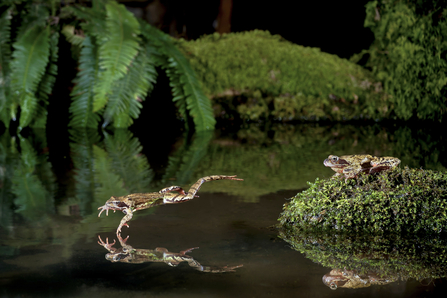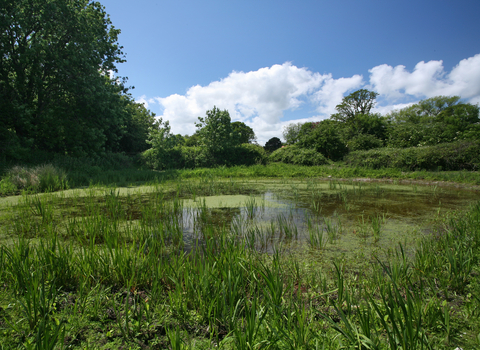Ponds support about two thirds of all freshwater species, while also providing non-aquatic animals such as mammals and reptiles with food and water. Like many forms of habitat, the UK’s ponds have come under increasing pressure from agriculture and development. An estimated 50% of ponds vanished in the 20th century and many of those that remain are in a poor or neglected state. Suffolk Wildlife Trust hopes to improve the health of the region’s ponds to create a spectrum of aquatic zones in which a myriad of creatures can find the right kinds of spaces to flourish. We hope the resources below will help you understand, restore and appropriately manage or create your pond

Common frogs by Dale Sutton
Pond Creation
|
A well-designed and well-sited pond can quickly become a rich wildlife haven, attracting not only those species that we think of as aquatic, but also many other animals that come to ponds to drink water or to find food. Find out how best to approach the creation of ponds and pond complexes. |
|
It is generally best to resist planting up new ponds and 'leave it to nature' to populate, but there are exceptions. See our golden rules of planting to make sure you create a suitable and sustainable habitat for a wide range of species. |
Pond management
|
Pond restoration and management Despite their abundance in the county, up to 70% of Suffolk’s 22,000 ponds are neglected or abandoned. Managed in the right way, a pond will quickly respond. See what steps you need to take to restore your pond. |
|
Are you worried about a pond that is drying up or fluctuations in the level of water? Take a look at what could be causing the problem and why in some cases, it's no problem at all. |
Pond problems
|
The presence of fish can significantly reduce the wildlife value of a pond. See how best to manage fish populations in your pond, from drainage to striking a compromise. |
|
Ducks are part of the ecological system too, but in great numbers they can cause considerable damage to a pond habitat. Find out what steps you can take to make sure your pond keeps a clean bill of health. |
|
Algae, although potentially unattractive and harmful, has a role to play in any pond, providing food and nesting sites for wildlife. But sometimes it can get out of hand. Find out if and how you should manage algae in your pond system. |
Key Suffolk species
|
The great crested newt is Britain's largest and most protected newt and a key indicator species. Find out more about this enchanting amphibian and what Suffolk Wildlife Trust is doing to ensure its survival. |
|
Dragonflies are synonymous with Suffolk's waterways but are under threat from pressures caused by development and intensive farming. See what action Suffolk Wildlife Trust is taking and how you can get involved. |

